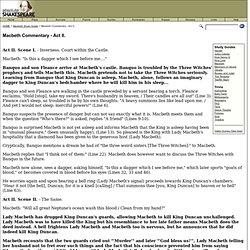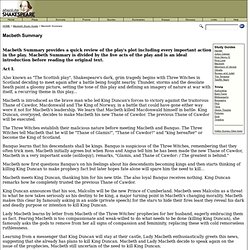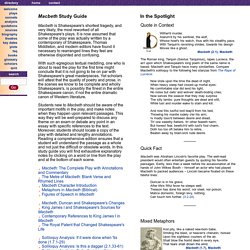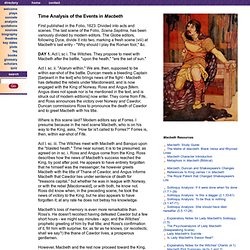

Macbeth Act 1, Scene 1 Summary. Three witches (a.k.a. the "weird sisters") meet on a foggy heath (an open plain) in Scotland, amidst thunder and lightening.

It's all very dramatic and mysterious. They discuss when they'll meet again, and decide to hook up "When the hurly-burly's done, when the battle's lost and won. " The implication is that they've been up to something really naughty. Brain snack: Even though the play's speech headings and stage directions refer to these three lovely ladies as "witches," the term "witch" only shows up once in the play.
The sisters are, however, called "weird" six times, but not "weird" like kooky and strange; they're "weird" like "wyrd," an Old English term meaning "fate. " Macbeth Act II. Commentary at Absolute Shakespeare. Act II.

Scene I. - Inverness. Court within the Castle. Macbeth: "Is this a dagger which I see before me.... " Banquo and son Fleance arrive at Macbeth's castle. Banquo is troubled by the Three Witches' prophecy and tells Macbeth this. Banquo and son Fleance are walking in the castle preceded by a servant bearing a torch. Banquo suspects the presence of danger but can not say exactly what it is. Banquo is surprised Macbeth is not yet asleep and informs Macbeth that the King is asleep having been in "unusual pleasure," (been unusually happy), (Line 13). Cryptically, Banquo mentions a dream he had of "the three weird sisters [The Three Witches]:" to Macbeth. Macbeth replies that "I think not of them:" (Line 22). Macbeth now alone, sees a dagger, asking himself, "Is this a dagger which I see before me," which later sports "goats of blood," or becomes covered in blood before his eyes (Lines 32, 33 and 46).
Act II. Macbeth: "Will all great Neptune's ocean wash this blood / Clean from my hand? " Scotland For Visitors -History - Tanistry and the Scots right of succession. Tanistry and the Scots right of succession Inheritance in Scotland was not a simple matter of the eldest son assuming the rights and titles of the father.

Primogeniture was established gradually in the twelfth century, in imitation of the Norman practices. Even then, it was only used in terms of royal succession, whilst other lordships continued to be inherited by the former system. The Tanist, under the system of Tanistry, was the heir presumptive and his right to the throne was not conferred by the father but by the mother. Matrilineal succession was typical of Pictish society and this by no means an uncommon practice, whether royal of commoner succession. Commonly the Tanist would be the son of the reigning king's sister rather than a chosen/favoured child of the King himself. This may at first appear an unusual or even unfair system. Macbeth l The Play l Passages.
Macbeth Videos. Index of Themes and Motifs. Interactive Shakespeare Project. Macbeth Summary guide at Absolute Shakespeare. Macbeth Summary provides a quick review of the play's plot including every important action in the play.

Macbeth Summary is divided by the five acts of the play and is an ideal introduction before reading the original text. Act I. Also known as "The Scottish play", Shakespeare's dark, grim tragedy begins with Three Witches in Scotland deciding to meet again after a battle being fought nearby. Thunder, storms and the desolate heath paint a gloomy picture, setting the tone of this play and defining an imagery of nature at war with itself, a recurring theme in this play... Macbeth is introduced as the brave man who led King Duncan's forces to victory against the traitorous Thane of Cawdor, Macdonwald and The King of Norway, in a battle that could have gone either way were it not for Macbeth's leadership.
The Three Witches establish their malicious nature before meeting Macbeth and Banquo. Banquo learns that his descendants shall be kings. Act II. Act III. Open Source Shakespeare: search Shakespeare's works, read the texts. Resources for Shakespeare's Macbeth - Macbeth explanatory notes, study quiz, character analysis and more. Quote in Context Wither'd murder, Alarum'd by his sentinel, the wolf, Whose howl's his watch, thus with his stealthy pace.

With Tarquin's ravishing strides, towards his design Moves like a ghost. S Macbeth - Time Analysis of the Events in the Play. Time Analysis of the Events in Macbeth First published in the Folio, 1623.

Divided into acts and scenes. The last scene of the Folio, Scena Septima, has been variously divided by modern editors. The Globe editors, following Dyce, divide it into two, marking a fresh scene (viii) at Macbeth's last entry - "Why should I play the Roman fool," &c. DAY 1.